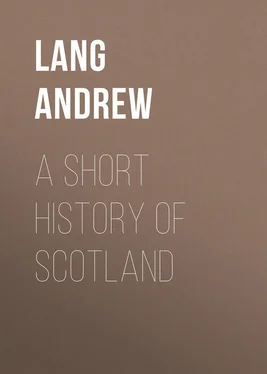Andrew Lang - A Short History of Scotland
Здесь есть возможность читать онлайн «Andrew Lang - A Short History of Scotland» — ознакомительный отрывок электронной книги совершенно бесплатно, а после прочтения отрывка купить полную версию. В некоторых случаях можно слушать аудио, скачать через торрент в формате fb2 и присутствует краткое содержание. Жанр: foreign_antique, foreign_prose, на английском языке. Описание произведения, (предисловие) а так же отзывы посетителей доступны на портале библиотеки ЛибКат.
- Название:A Short History of Scotland
- Автор:
- Жанр:
- Год:неизвестен
- ISBN:нет данных
- Рейтинг книги:4 / 5. Голосов: 1
-
Избранное:Добавить в избранное
- Отзывы:
-
Ваша оценка:
- 80
- 1
- 2
- 3
- 4
- 5
A Short History of Scotland: краткое содержание, описание и аннотация
Предлагаем к чтению аннотацию, описание, краткое содержание или предисловие (зависит от того, что написал сам автор книги «A Short History of Scotland»). Если вы не нашли необходимую информацию о книге — напишите в комментариях, мы постараемся отыскать её.
A Short History of Scotland — читать онлайн ознакомительный отрывок
Ниже представлен текст книги, разбитый по страницам. Система сохранения места последней прочитанной страницы, позволяет с удобством читать онлайн бесплатно книгу «A Short History of Scotland», без необходимости каждый раз заново искать на чём Вы остановились. Поставьте закладку, и сможете в любой момент перейти на страницу, на которой закончили чтение.
Интервал:
Закладка:
The intrigues which follow, and the truth about the character of James, are exceedingly obscure. We have no Scottish chronicle written at the time; the later histories, by Ferrerius, an Italian, and, much later, by Queen Mary’s Bishop Lesley, and by George Buchanan, are full of rumours and contradictions, while the State Papers and Treaties of England merely prove the extreme treachery of James’s brother Albany, and no evidence tells us how James contrived to get the better of the traitor. James’s brothers Albany and Mar were popular; were good horsemen, men of their hands, and Cochrane is accused of persuading James to arrest Mar on a charge of treason and black magic. Many witches are said to have been burned: perhaps the only such case before the Reformation. However it fell out – all is obscure – Mar died in prison; while Albany, also a prisoner on charges of treasonable intrigues with the inveterate Earl of Douglas, in the English interest, escaped to France.
Douglas (1482) brought him to England, where he swore allegiance to Edward IV., under whom, like Edward Balliol, he would hold Scotland if crowned. He was advancing on the Border with Edward’s support and with the Duke of Gloucester (Richard III.), and James had gone to Lauder to encounter him, when the Earl of Angus headed a conspiracy of nobles, such as Huntly, Lennox, and Buchan, seized Cochrane and other favourites of James, and hanged them over Lauder Bridge. The most tangible grievance was the increasing debasement of the coinage. James was immured at Edinburgh, but, by a compromise, Albany was restored to rank and estates. Meanwhile Gloucester captured Berwick, never to be recovered by Scotland. In 1483 Albany renewed, with many of the nobles, his intrigues with Edward for the betrayal of Scotland. In some unknown way James separated Albany from his confederates Atholl, Buchan, and Angus; Albany went to England, betrayed the Castle of Dunbar to England, and was only checked in his treasons by the death of Edward IV. (April 9, 1483), after which a full Parliament (July 7, 1483) condemned him and forfeited him in his absence. On July 22, 1484, he invaded Scotland with his ally, Douglas; they were routed at Lochmaben, Douglas was taken, and, by singular clemency, was merely placed in seclusion in the Monastery of Lindores, while Albany, escaping to France, perished in a tournament, leaving a descendant, who later, in the minority of James V., makes a figure in history.
The death of Richard III. (August 18, 1485) and the accession of the prudent Henry VII. gave James a moment of safety. He turned his attention to the Church, and determined to prosecute for treason such Scottish clerics as purchased benefices through Rome. He negotiated for three English marriages, including that of his son James, Duke of Rothesay, to a daughter of Edward IV.; he also negotiated for the recovery of Berwick, taken by Gloucester during Albany’s invasion of 1482. After his death, and before it, James was accused, for these reasons, of disloyal dealings with England; and such nobles as Angus, up to the neck as they were in treason and rebellion, raised a party against him on the score that he was acting as they did. The almost aimless treachery of the Douglases, Red or Black, endured for centuries from the reign of David II. to that of James VI. Many nobles had received no amnesty for the outrage of Lauder Bridge; their hopes turned to the heir of the Crown, James, Duke of Rothesay. We see them offering peace for an indemnity in a Parliament of October 1487; the Estates refused all such pardons for a space of seven years; the king’s party was manifestly the stronger. He was not to be intimidated; he offended Home and the Humes by annexing the Priory of Coldingham (which they regarded as their own) to the Royal Chapel at Stirling. The inveterate Angus, with others, induced Prince James to join them under arms. James took the Chancellorship from Argyll and sent envoys to England.
The rebels, proclaiming the prince as king, intrigued with Henry VII.; James was driven across the Forth, and was supported in the north by his uncle, Atholl, and by Huntly, Crawford, and Lord Lindsay of the Byres, Errol, Glamis, Forbes, and Tullibardine, and the chivalry of Angus and Strathtay. Attempts at pacification failed; Stirling Castle was betrayed to the rebels, and James’s host, swollen by the loyal burgesses of the towns, met the Border spears of Home and Hepburn, the Galloway men, and the levies of Angus at Sauchie Burn, near Bannockburn.
In some way not understood, James, riding without a single knight or squire, fell from his horse, which had apparently run away with him, at Beaton’s Mill, and was slain in bed, it was rumoured, by a priest, feigned or false, who heard his confession. The obscurity of his reign hangs darkest over his death, and the virulent Buchanan slandered him in his grave. Under his reign, Henryson, the greatest of the Chaucerian school in Scotland, produced his admirable poems. Many other poets whose works are lost were flourishing; and The Wallace , that elaborate plagiarism from Barbour’s ‘The Brus,’ was composed, and attributed to Blind Harry, a paid minstrel about the Court. 12 12 See p. 38, note 1.
CHAPTER XIV. JAMES IV
The new king, with Angus for his Governor, Argyll for his Chancellor, and with the Kers and Hepburns in office, was crowned at Scone about June 25, 1488. He was nearly seventeen, no child, but energetic in business as in pleasure, though lifelong remorse for his rebellion gnawed at his heart. He promptly put down a rebellion of the late king’s friends and of the late king’s foe, Lennox, then strong in the possession of Dumbarton Castle, which, as it commands the sea-entrance by Clyde, is of great importance in the reign of Mary and James VI. James III. must have paid attention to the navy, which, under Sir Andrew Wood, already faced English pirates triumphantly. James IV. spent much money on his fleet, buying timber from France, for he was determined to make Scotland a power of weight in Europe. But at the pinch his navy vanished like a mist.
Spanish envoys and envoys from the Duchess of Burgundy visited James in 1488-1489; he was in close relations with France and Denmark, and caused anxieties to the first Tudor king, Henry VII., who kept up the Douglas alliance with Angus, and bought over Scottish politicians. While James, as his account-books show, was playing cards with Angus, that traitor was also negotiating the sale of Hermitage Castle, the main hold of the Middle Border, to England. He was detected, and the castle was intrusted to a Hepburn, Earl of Bothwell; it was still held by Queen Mary’s Bothwell in 1567. The Hepburns rose to the earldom of Bothwell on the death of Ramsay, a favourite of James III., who (1491) had arranged to kidnap James IV. with his brother, and hand them over to Henry VII., for £277, 13s. 4d.! Nothing came of this, and a truce with England was arranged in 1491. Through four reigns, till James VI. came to the English throne, the Tudor policy was to buy Scottish traitors, and attempt to secure the person of the Scottish monarch.
Meanwhile, the Church was rent by jealousies between the holder of the newly-created Archbishop of Glasgow (1491) and the Archbishop of St Andrews, and disturbed by the Lollards, in the region which was later the centre of the fiercest Covenanters, – Kyle in Ayrshire. But James laughed away the charges against the heretics (1494), whose views were, on many points, those of John Knox. In 1493-1495 James dealt in the usual way with the Highlanders and “the wicked blood of the Isles”: some were hanged, some imprisoned, some became sureties for the peacefulness of their clans. In 1495, by way of tit-for-tat against English schemes, James began to back the claims of Perkin Warbeck, pretending to be Richard, Duke of York, escaped from the assassins employed by Richard III. Perkin, whoever he was, had probably been intriguing between Ireland and Burgundy since 1488. He was welcomed by James at Stirling in November 1495, and was wedded to the king’s cousin, Catherine Gordon, daughter of the Earl of Huntly, now supreme in the north. Rejecting a daughter of England, and Spanish efforts at pacification, James prepared to invade England in Perkin’s cause; the scheme was sold by Ramsay, the would-be kidnapper, and came to no more than a useless raid of September 1496, followed by a futile attempt and a retreat in July 1497. The Spanish envoy, de Ayala, negotiated a seven-years’ truce in September, after Perkin had failed and been taken at Taunton.
Читать дальшеИнтервал:
Закладка:
Похожие книги на «A Short History of Scotland»
Представляем Вашему вниманию похожие книги на «A Short History of Scotland» списком для выбора. Мы отобрали схожую по названию и смыслу литературу в надежде предоставить читателям больше вариантов отыскать новые, интересные, ещё непрочитанные произведения.
Обсуждение, отзывы о книге «A Short History of Scotland» и просто собственные мнения читателей. Оставьте ваши комментарии, напишите, что Вы думаете о произведении, его смысле или главных героях. Укажите что конкретно понравилось, а что нет, и почему Вы так считаете.












